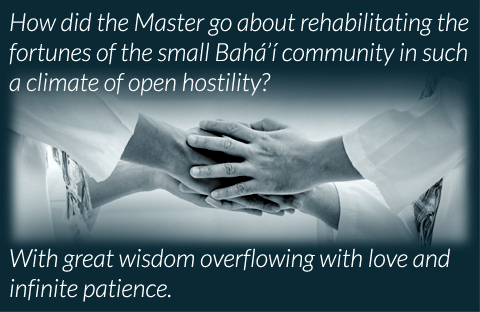|
|
|
Episode 4 August 2, 2021 The Master in All Things But in the Most Great Prison We do not meet the people who are not within the fold of the Cause. We have closed the door of social intercourse. It is the Master Who has taken every trouble upon Himself. For Our sake, in order that We may have ease and comfort, He faces the world and its peoples. For Us He has become a mighty stronghold, a mighty armour. He has arisen with all His power to serve the Faith, and confirmation crowns His effort. – Bahá’u’lláh  Although Bahá’u’lláh’s spiritual power and authority were unassailable even by the most malign forces, it was Abbás Effendí, now known by all as the Master and serving as Bahá’u’lláh’s shield, who set about repairing relationships between the authorities, townspeople and the small community of Bahá’ís after a fresh wave of tribulations and persecutions once again overtook them. Once again, although the Bahá’í community now lived as prisoners within the walled citadel of ‘Akká, the people treated them with loathing and cruel disrespect. Once again, a poisoned atmosphere of suspicion and fear enveloped the town. Once again, the authorities were bristling with animosity and inflexibility. How did the Master go about rehabilitating the fortunes of the small Bahá’í community in such a climate of open hostility? With great wisdom overflowing with love and infinite patience. As though gently and slowly smoothing the feathers of an angry bird, the Master set about mending fences while the stalwart community continued to live their lives with integrity and moral rectitude. In the course of His efforts over the following months and years, the Master exuded a noble authority that swayed many a hardened heart, and for those who adamantly refused to consider His humanity and genuine love, He showed nothing but a patient and kindly face. Shaykh Mahmud was one such man. He blindly hated the Bahá’ís and upon hearing praise being heaped on the Bahá’ís and on Abbás Effendí in particular, he grew incensed and decided to find Him and express his hatred in person. Upon finding Him he assaulted the Master Who only looked at him with calm dignity and reminded him of what the Prophet Muhammad had said: “Be generous to the guest, even should he be an infidel.” Shaykh Mahmud, nonplussed, felt his hatred and anger slip away like the shadows of night upon the rising of the sun. He fled to his home and barred the door to all. Later, he tearfully sought out the Master and falling on his knees, said: ‘Which door but thine can I seek; whose bounty can I hope for but thine?” Shaykh Mahmud became a devoted Bahá’í.
|
|
|